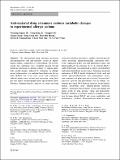Anti-malarial drug artesunate restores metabolic changes in experimental allergic asthma
Author(s)
Xu, Yong-Jiang; Xu, Fengguo; Cheng, Chang; Huang, Shao-Min; Peh, Hong Yong; Ong, Choon Nam; Wong, W. S. Fred; Ho, Wanxing Eugene; Tannenbaum, Steven R; ... Show more Show less
Download11306_2014_Article_699.pdf (981.7Kb)
OPEN_ACCESS_POLICY
Open Access Policy
Creative Commons Attribution-Noncommercial-Share Alike
Terms of use
Metadata
Show full item recordAbstract
The anti-malarial drug artesunate possesses anti-inflammatory and anti-oxidative actions in experimental asthma, comparable to corticosteroid. We hypothesized that artesunate may modulate disease-relevant metabolic alterations in allergic asthma. To explore metabolic profile changes induced by artesunate in allergic airway inflammation, we analysed bronchoalveolar lavage fluid (BALF) and serum from naïve and ovalbumin-induced asthma mice treated with artesunate, using both gas and liquid chromatography-mass spectrometry metabolomics. Pharmacokinetics analyses of serum and lung tissues revealed that artesunate is rapidly converted into the active metabolite dihydroartemisinin. Artesunate effectively suppressed BALF total and differential counts, and repressed BALF Th2 cytokines, IL-17, IL-12(p40), MCP-1 and G-CSF levels. Artesunate had no effects on both BALF and serum metabolome in naïve mice. Artesunate promoted restoration of BALF sterols (cholesterol, cholic acid and cortol), phosphatidylcholines and carbohydrates (arabinose, mannose and galactose) and of serum 18-oxocortisol, galactose, glucose and glucouronic acid in asthma. Artesunate prevented OVA-induced increases in pro-inflammatory metabolites from arginine–proline metabolic pathway, particularly BALF levels of urea and alanine and serum levels of urea, proline, valine and homoserine. Multiple statistical correlation analyses revealed association between altered BALF and serum metabolites and inflammatory cytokines. Dexamethasone failed to reduce urea level and caused widespread changes in metabolites irrelevant to asthma development. Here we report the first metabolome profile of artesunate treatment in experimental asthma. Artesunate restored specific metabolic perturbations in airway inflammation, which correlated well with its anti-inflammatory actions. Our metabolomics findings further strengthen the therapeutic value of using artesunate to treat allergic asthma.
Date issued
2014-07Department
Singapore-MIT Alliance in Research and Technology (SMART)Journal
Metabolomics
Publisher
Springer US
Citation
Ho, Wanxing Eugene et al. “Anti-Malarial Drug Artesunate Restores Metabolic Changes in Experimental Allergic Asthma.” Metabolomics 11.2 (2015): 380–390.
Version: Author's final manuscript
ISSN
1573-3882
1573-3890